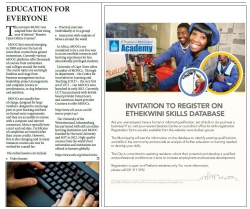African Renaissance - Education for Everyone2016-05-19 The acronym MOOC was adapted from the fast rising area of interest “Massive Open Online Coursesâ€.
MOOC first started emerging in 2008 and over the last six years these courses have gained momentum. Currently various MOOC platforms offer thousands of courses from universities and colleges around the world. The course topics are seemingly limitless and range from business management such as leadership; project management; and computer science to aerodynamics, or dog behaviour and nutrition. MOOCs are usually free of charge, designed for large numbers, designed to encourage peer-to-peer learning and have no formal entry requirements and they are accessible to anyone with a computer and internet connection. Moocs typically have a start and end date. Certificates of completion are issued rather than course credits. However, this is also changing and in many instances courses can now be verified for a small fee. The online lessons can include:
University of Cape Town offers a number of MOOCs. Through its department âˆ' the Centre for Innovation in Learning and Teaching (CILT) âˆ' the very first set of UCT âˆ' run MOOCs were launched in early 2015. Currently, UCT has partnered with British based provider FutureLearn and American-based provider Coursera to offer MOOCs. http://www.cilt.uct.ac.za/cilt/moocs-project-uct The University of the Witwatersrand, Johannesburg has partnered with edX an online learning destination and MOOC founded by Harvard University and MIT in 2012. High-quality courses from the world’s best universities and institutions are offered to learners globally. https://www.edx.org/school/witsx |
African Renaissance - Education for Everyone
Copyright © 2026 KwaZulu-Natal Top Business
